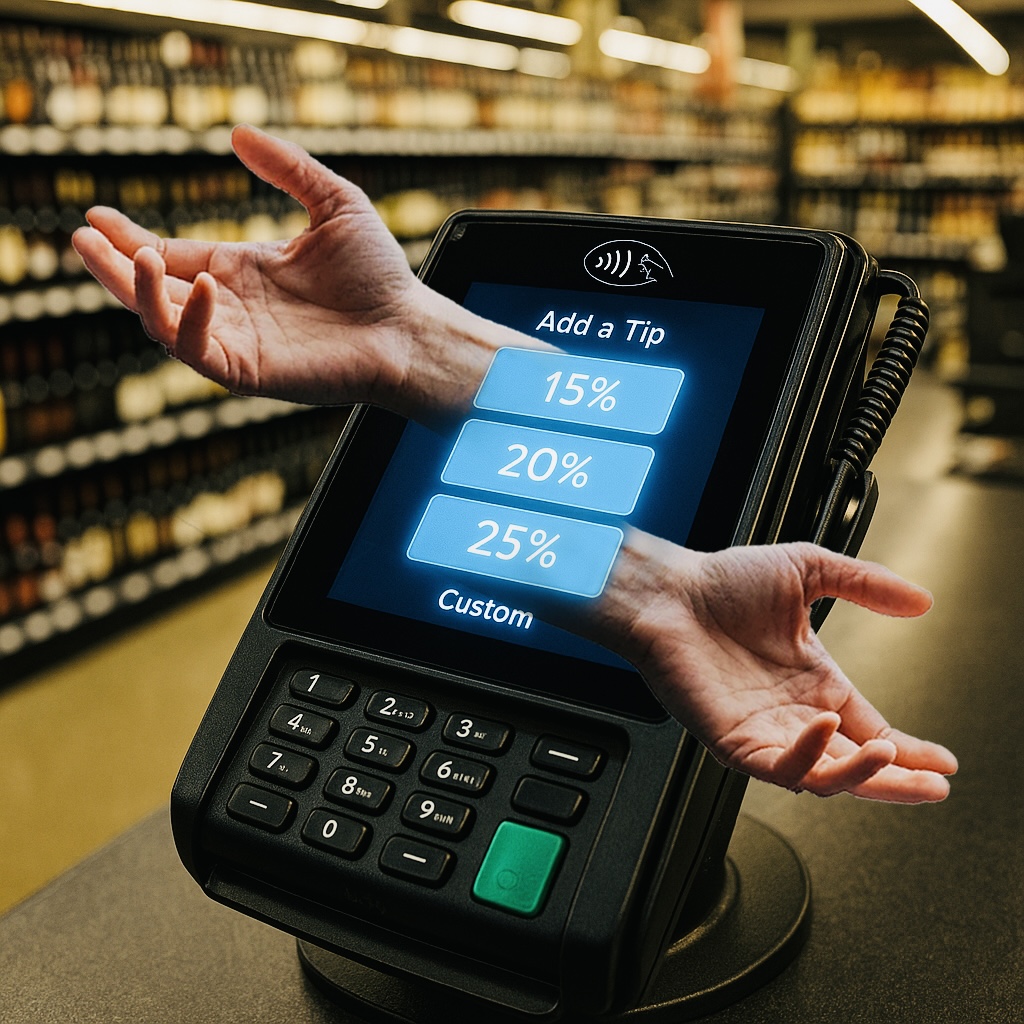Blog
Here’s A Tip: Stop It
Once upon a more civilized time, tipping came after the service.
You’d finish your meal, reflect on the evening, and if your maître d’ had successfully banished the squawking couple from table four and your server had floated your soufflé in like the culinary gods blessed it, you tipped accordingly. It was a reward. An acknowledgment. A “thank you for making my night feel like a scene from a movie where I could pretend for 90 minutes I wasn’t human garbage.” It was common-sense customer retention. I learned this from my father, who was neck-deep in the high-end restaurant world, where service was an art, not an app.
Tipping extended beyond fine dining to bellhops who carried your bags like they were transporting royal heirlooms or salon magicians who made you feel three inches taller and ten years younger. It was a “thank you for going above and beyond,” not “here’s your cut of my survival.” Now, it’s a preemptive shakedown. A manipulative guilt tax dressed up in pastel UX design.
I can’t buy a loaf of bread without being panhandled by a payment screen. I’m asked to tip at small grocery stores, to robots, and to people who are nowhere in sight. Tipping has become the shadow side of donating, and modern commerce has learned how to package it to resemble a donation, borrowing the language and emotional cues of generosity to trigger your better nature. But it’s nothing more than a con wearing kindness as camouflage. Tipping is, “Hey, you just paid full price. How about subsidizing our wage model at the same time?” Donating is “Would you like to contribute to something bigger than this moment?” It’s proactive, intentional, and often aligned with personal values. However, when both are funnelled into the same digital platform, they become quick, emotional, and transactional, eroding the authenticity of genuine giving. They’re served up the same way: oversized buttons, overbearing prompts, and undertones of “If you don’t, you’re a sociopath.”
I donate, but I choose where, when, and why. I don’t need a judgmental glance from a teenage cashier because I didn’t round up for “Box Stores for World Peace” so they can collect tax write-offs while waving my virtue around like it’s their own. It’s as if the ‘tipping mindset’ has now metastasized to donating, even knocking on neighbourhood doors with a clipboard and an agenda.
Let me paint the modern scenario. I park my car during a storm, sprint through sleet, soaked to the bone, grab my groceries, scan them, bag them myself, and then you want me to tip? For what? For surviving? At that point, I should be tipping myself for Herculean effort. In fact, where’s my button? “Thank you for doing everything alone. Please enjoy a 10 percent discount as a tip to you, Warrior of Capitalism.” Earlier in the day, the barista couldn’t hear my order because they were mid-scroll checking if their meme had gone viral. My car is about to be ticketed, and I’m being asked to pre-tip for the honour of receiving burnt milk and passive aggression.
We used to tip after the experience, you know, like dessert, applause, high-fiving, or regret. Now we’re tipping before, during, and after, like we’re trying to summon a demon of customer satisfaction through monetary incantation. And you know what? If you don’t tip, you feel like an asshole. It’s a lose-lose shame spiral. The system is broken. The tipping scale is weighed down with tip fatigue, further taxing our very core.
At the start of the COVID pandemic, we all tipped heavily out of solidarity, humanity, or even guilt, and I got lukewarm service with a side of indifference. So I stopped. And I began watching as this entire thing evolved. I realized I could leave a glowing review and bring more customers through the door than any pooled tip jar ever could. But strangely, that didn’t matter.
Tipping has become like that gnat you can’t see but keeps dive-bombing your face, annoying, invasive, and immune to reason. I’m fully expecting an email from the cable company after a customer service call, “We hope you enjoyed being on hold for 57 minutes. Please leave a tip for our bot, Craig.” They get data, and I get existential dread with the exchange costing me a slice of my mortal existence. What’s next, tipping our doctor? “Great incision, Doc, here’s 20 percent for the finesse. Where does it stop? Should we tip the pharmacist for not miscounting pills? The dentist for not hitting a nerve? The mechanic for not cutting the brake line? No, because these are paid professionals. Service is their job. The transaction is complete.
So why are we tipping someone for handing us a muffin? Why are we tipping when we’re already paying? We bring the business. We buy the product. We are the reason the lights are on. And yet, somehow, we’re the ones expected to subsidize the wages, cover the staffing gap, and support the business model with a digital wink and a 20 percent guilt tax. “Please rate your interaction and choose a tip.” What interaction? I walked in, touched a screen, and paid $6 for a pastry that wasn’t even wrapped.
Screens and systems are taking advantage of us at a time when no one has “extra” to spare while being charged extra for everything. It’s a bailout with a side of emotional blackmail. We’re not tipping because the service exceeded our expectations. We’re tipping because the business’s structure depends on it. And that burden has been passed onto the consumer under the guise of kindness. It’s not a thank-you anymore. It’s a co-pay for capitalism’s refusal to pay its workers.
Paying It Forward is what tipping thinks it is when it looks in the mirror, declaring, “You’re generous. You’re thoughtful. You make people’s days.” Bless its delusional little heart. Meanwhile, Paying It Forward walks by, tosses a coffee to a stranger, and keeps it moving—like the silent badass of generosity it is. Because paying it forward isn’t transactional, it isn’t performed for the surveillance camera cleverly disguised as a debit terminal. There’s no forced smile, no pixelated pressure, no “Would you like to add a tip or be publicly branded a miser?” popup. It’s just raw, honest, no-strings-attached humanity.
You don’t pay it forward because someone “earned” it. You do it because once, someone shocked you with kindness, and it short-circuited your cynicism for five whole minutes. It’s that moment when someone’s $3 short at checkout. Instead of watching them awkwardly negotiate with their coin purse, you say, “I got you.” A ripple in the matrix. Tipping today is, “Would you like to subsidize our underpaid staff while being scored in real time for decency?” Paying It Forward is, “Hey. I got this. For no reason. Because life is hard, and you look like you need a win.”
Paying It Forward is the Audrey Hepburn of Generosity, graceful, timeless and effortlessly kind. You do it because it means something to you. Tipping, meanwhile, has become a moral booby trap; decline, and you’ve essentially kicked a puppy on camera. Paying it forward says, “I don’t even know you, but I believe in surprise and joy. Tipping maintains the status quo. Paying it forward? That stuff spreads. It hits differently. It shocks people out of autopilot. It restores faith in humanity, one coffee and awkward smile at a time. By donating or paying it forward, you decide who receives your energy, time, or money. Not a blinking screen at checkout asking if you want to give 20 percent or perhaps even more to a ghost you never saw.
Paying it forward is bespoke kindness. It’s spiritual guerrilla warfare. Tipping thinks it’s sexy when it’s capitalism in a trench coat, begging with open hands. Paying it forward is the quiet rebel act of giving a damn without needing applause. It’s micro-activism. It has the power to shift a culture, not just pad a payroll. Want to shake up the world? Startle and confuse it with genuine kindness, not this performative digital mugging we’ve normalized. Short on groceries? Here’s a few bucks. No coupon at checkout? I’ve got one you can have. Paying it forward is the soulful cousin of tipping that hasn’t sold out by getting a QR code.
So my final tip: Stop it. Pay people what they’re worth. Price your goods honestly, and leave me out of your psychological warfare at the checkout. Either you want me as a customer or as a financier. But you can’t have both. I’ll happily take my business to a place where kindness hasn’t been commodified and keep my tip for the person doing the work, me.

